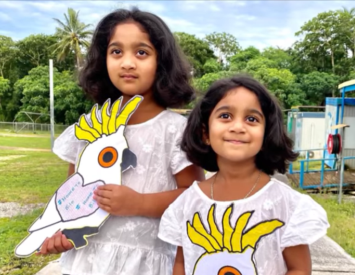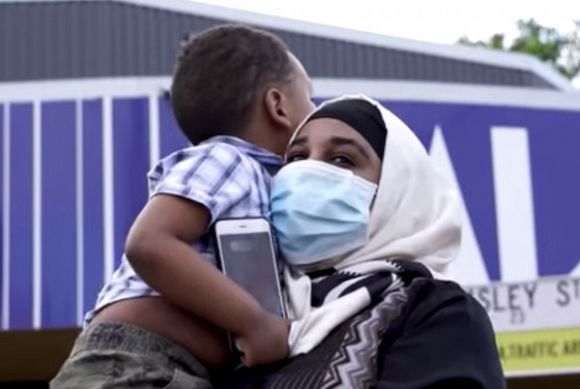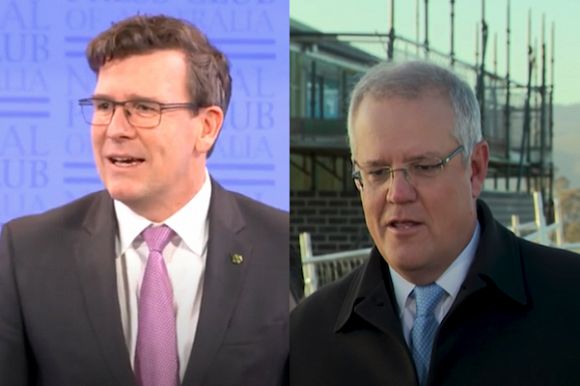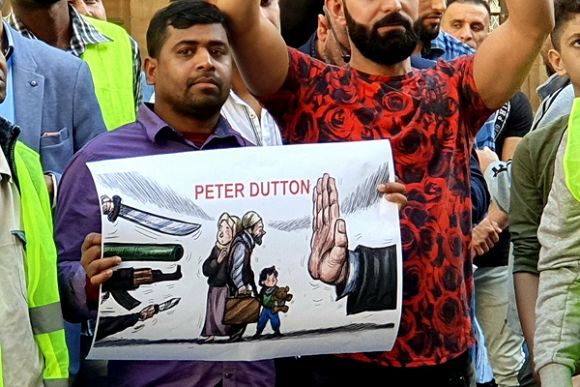Locking people away in detention centres for indefinite periods, then releasing them unsupported into the community is not the way to build a successful multicultural society, writes Dr Sabrin Farooqui.
MOST AUSTRALIANS have been appalled by the plight of the Murugappan family, who were formerly based in Biloela in Queensland and who have been languishing in gaol on Christmas lsland for three years.
More recently, after the youngest girl fell ill and was left for many days without medical attention, there was an even louder outcry which led to the child being flown to a hospital in Perth.
This family’s unacceptable but high-profile story sadly masks the awful circumstances of hundreds of asylum seekers in Australia who have had their lives destroyed by war and violence in their home countries, only to be held in detention after reaching – what they thought – would be a safe place.
Few Australians know their stories and even fewer have the opportunity to hear their voices — and there are so many voices to be heard.
Since the beginning of 2021, more than 100 refugees have been released from immigration detention centres from around Australia and sent to live in various capital cities or other communities. These releases have been done quietly and without fanfare, some due to standard processes and others after sustained and public campaigns by people who were aware of their situations.
They all came from different backgrounds, brought with them unique experiences and held widely varying expectations of their new lives in Australia. What they had in common was a future marred by uncertainty. They had no idea that they would spend years in detention, that their release would be conditional and that they would experience serious challenges.
After a life of trauma back home, the uncertainty of a dangerous boat journey and being subject to the prospect of indefinite detention, refugees found themselves at high risk of mental and physical illness.
Some were brought to Australia’s mainland, given the most minimum of treatments in hospital and then quietly released into the community without money, job prospects and left to fend for themselves. These are not isolated cases. They are fast becoming the norm.
I recently had the privilege of meeting several refugees who have escaped trauma and in some cases death in their homeland, only to be put through more pain by Australia’s immigration process.
*Umayer is a refugee who fled Pakistan after his life was threatened there. He came to Australia by boat in 2012 for what he hoped would be a better and safer life. Instead, he was kept on Christmas Island for a short period before being sent to Nauru.
His detention in Nauru lasted eight years until he inevitably fell ill due to the conditions in the detention centre. He received very little treatment on Nauru and in January this year was finally transferred to Sydney, again given minimal treatment and then transferred to a local detention centre, still suffering an illness.
After two months, the Federal Government, without explanation, set Umayer free.
Umayer told Independent Australia he has to fend for himself:
“I can’t see my future. I am so sick. I don’t know when I will be physically capable to do work.”
Since his release, life is one long punishment for Umayer. He is not alone.
*Aziz recalled his life on Nauru:
“Panadol was the only solution to all sorts of physical problems. No other medical treatment was available there.”
He was seriously injured after locals – who objected to Australia “dumping” its asylum seekers close to their homes – gave him a beating in the streets.
Aziz sustained significant damage to his teeth and requires specialist dental care. The Federal Government transferred him to Australia but did not offer treatment. Instead, he was given a Medicare card and released into the community. Medicare does not cover the specialist treatment Aziz needs and his injury means he cannot eat properly. This limits his lifestyle and ability to work.
Isolated life in detention centres has completely changed these people. Once brave and confident enough to risk a dangerous boat journey for a better life for themselves and their families, they no longer have any confidence in their own abilities or the system that is supposed to protect them.
On his unsupported release from detention, *Sabir, a Rohingya refugee from Myanmar, said:
“I felt scared the first time I went to a shopping centre. I didn’t see so many people together in a long time.”
Sabir wants to have training to improve his chances of securing a job but does not have the financial resources. It is a vicious circle. He cannot get a job because he has no training, yet he cannot afford training because he has no job.
His prospects are further complicated by the illness he developed on Nauru that went untreated:
“I developed severe optometric illness while staying in Nauru and it got worse with time but there was no treatment there. It will impact my capacity to get a job if it goes untreated and, as you know, Medicare does not cover eye treatment.”
It is clear that many asylum seekers’ medical problems can be directly attributed to being locked up in detention centres for up to eight years and sometimes longer.
The United Nations Higher Commissioner for Refugees (UNHCR) says that a “durable solution” has to be found for a person seeking asylum to live safely by providing a permanent visa; reintegration; resettlement or repatriation. Processing should be done within two years at most to find a “durable solution” for people seeking asylum.
Keeping someone locked in an offshore processing centre for eight years, or indefinitely in some cases, does not provide a durable solution.
At present, there are still about 1,700 people whose lives have been in limbo since 19 July 2013. Almost 1,500 are in detention in Australia, while about 89 refugees are still in Papua New Guinea (PNG) and 78 are being held on Nauru. A further 1,200 have been transferred to Australia from PNG and Nauru for medical reasons. Another 200 have been transferred to Australia under Medevac. For almost eight years, their lives have been on hold and they are unable to plan for their futures.
Once released, it is hard for them to find employment in Australia after being incarcerated for eight years. They need training to prepare for the job market but just as importantly, they need psychological support.
Some volunteer activists and charity organisations have helped by providing food and rent for accommodation but there is a world of uncertainty in front of them and they do not know how long they will get these ad hoc supports.
It is high time the Australian Government recognised the benefits of a multicultural society and the positive contribution refugees and those seeking asylum in Australia can bring to our communities.
Locking people away in detention centres for long or indefinite periods, then releasing them unsupported into society, is not the way to build a sustainable and successful multicultural society.
It does not reflect the highly valued Australian ethos of providing a fair go for all.
*Names have been changed to protect individual privacy.
Dr Sabrin Farooqui is a passionate community advocate for social justice and cultural diversity. She has worked for private and public sectors, in higher education, research and policy. Currently, she is the president of Cultural Diversity Network Inc.
 This work is licensed under a Creative Commons Attribution-NonCommercial-NoDerivs 3.0 Australia License
This work is licensed under a Creative Commons Attribution-NonCommercial-NoDerivs 3.0 Australia License
Support independent journalism Subscribe to IA.

Related Articles
- ‘No one cares about us’: Lives of detainees in alternative places of detention
- Australia's offshore detention program under Turnbull and Dutton: An update
- The impact of refugee detention: A true story
- Julian Burnside: What sort of country are we?
- Australia's refugee kidnapping: Our own Voyage of the Damned















